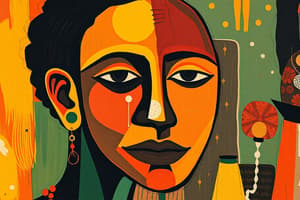Podcast
Questions and Answers
What distinguishes human language from animal communication?
What distinguishes human language from animal communication?
- Humans pass on cultural traits to offspring. (correct)
- Animals can transmit genetic materials.
- Only humans can mimic animal behaviors.
- Humans use more sounds.
Which branch of linguistic anthropology focuses on the relationship between language and culture?
Which branch of linguistic anthropology focuses on the relationship between language and culture?
- Structural Linguistics
- Ethno-linguistics (correct)
- Socio-linguistics
- Historical Linguistics
What is primarily studied in Structural or Descriptive Linguistics?
What is primarily studied in Structural or Descriptive Linguistics?
- The relationship of language to societal structures.
- The overall structure and rules of languages. (correct)
- The effects of language on cultural perceptions.
- The historical development of languages.
What aspect of language does Historical Linguistics mainly address?
What aspect of language does Historical Linguistics mainly address?
Why can individuals learn languages other than their mother tongue, according to structural linguists?
Why can individuals learn languages other than their mother tongue, according to structural linguists?
What distinguishes anthropology from other academic disciplines that study humans?
What distinguishes anthropology from other academic disciplines that study humans?
Which statement about anthropology is accurate regarding its goals and methods?
Which statement about anthropology is accurate regarding its goals and methods?
How does anthropology approach the study of human beings?
How does anthropology approach the study of human beings?
What kind of questions does anthropology aim to explore about humanity?
What kind of questions does anthropology aim to explore about humanity?
What is one of the key characteristics of anthropology as a scientific discipline?
What is one of the key characteristics of anthropology as a scientific discipline?
Flashcards are hidden until you start studying
Study Notes
Anthropology Overview
- Anthropology combines biological and cultural characteristics, essential for understanding human nature.
- It's distinguished from other disciplines (sociology, biology, psychology) by its focus on human origins, development, and variations globally.
Key Objectives of Anthropology
- Investigates learned and shared living strategies among human social groups.
- Examines shared traits of homo sapiens and diverse lifestyles adapted to different environments.
- Analyzes material cultures (objects) and non-material cultures (beliefs, social values).
Cultural and Philosophical Insights
- Anthropology explores intricate cultural patterns and societal structures through empirical studies.
- It raises philosophical questions about human similarities and differences and seeks to create a comprehensive understanding of humankind.
Language's Role
- Language facilitates communication through sound, gestures, and visual writing, acting as a conduit of cultural knowledge across generations.
- It’s argued that language forms a distinctive trait of humanity, differentiating humans from animals.
Branches of Linguistic Anthropology
- Structural/Descriptive Linguistics: Studies language structure, including sound systems and grammatical rules, essential for understanding language patterns.
- Ethno-linguistics: Investigates the relation between language and culture, reflecting cultural emphasis in vocabulary (e.g., terms for snow among Inuit).
- Historical Linguistics: Explores language evolution and divergence over time, connecting to cultural features and practices through detailed ethnographies.
- Socio-linguistics: Examines language in social contexts and its influence on identity and social dynamics.
Ethnography vs. Ethnology
- Ethnography involves exhaustive fieldwork to gather community-specific data, often resulting in qualitative descriptions.
- Ethnology compares varying cultures, interpreting ethnographic findings to identify common principles governing human behavior.
Subfields of Socio-Cultural Anthropology
- Includes specialized fields like Medical Anthropology, Urban Anthropology, and Ethnomusicology, focusing on specific societal aspects and human interactions.
- Utilizes qualitative research methods, such as participant observation and in-depth interviews, to explore cultural practices and social continuity.
Emic vs. Etic Perspectives
- Emphasizes 'emic' perspectives, centering on insider views to understand cultural meanings and justifications for behaviors.
Fieldwork in Anthropology
- Involves long-term engagement with communities, allowing anthropologists to capture nuanced social processes and cultural dynamics.
- Ethnographic data collection requires comprehensive immersion into the studied group’s daily life.
Misconceptions about Anthropology
- Common misconception limits anthropology to "primitive" societies; contemporary anthropologists study both rural and advanced urban cultures.
- People often believe anthropologists focus solely on rural populations, neglecting complex societal dynamics in urban settings.
Marriage Systems
- Societies have rules governing marriage, including monogamy (one spouse) and polygamy (multiple spouses) which can be categorized as:
- Polygyny: One man married to multiple women.
- Polyandry: One woman married to multiple men.
- Sororal Polygyny: Marriage of a man to sisters simultaneously.
- Wealth and status implications: Polygamous marriages can signify prestige and socioeconomic advantages, but may also incite jealousy among co-wives.
Economic Contracts in Marriage
- Marriage often entails a binding contract involving the transfer of rights (sexual access, legal rights to children, and property rights).
- Economic considerations form a critical aspect of marital relationships, underscoring the interconnectedness of social norms and economic conditions.
Studying That Suits You
Use AI to generate personalized quizzes and flashcards to suit your learning preferences.




